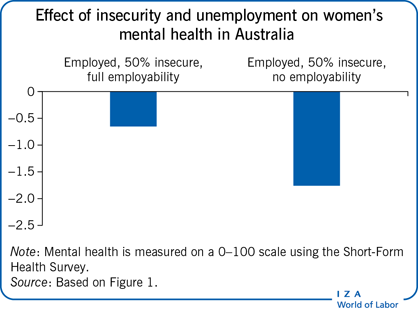Elevator pitch
The fear of unemployment has increased around the world in the wake of Covid-19. Research has shown that job insecurity affects both mental and physical health, though the effects are lower when employees are easily re-employable. The detrimental effects of job insecurity could be partly mitigated if employers improved other aspects of job quality that support better health. But as job insecurity is felt by many more people than just the unemployed, the negative health effects during recessions are multiplied and extend through the majority of the population. This reinforces the need for effective, stabilising macroeconomic policies, most especially at this time of pandemic.

Key findings
Pros
Many cross-sectional studies in epidemiology, psychology, and economics show a strong connection between job insecurity and poor physical or mental health.
Some studies confirm that the effects of job insecurity on health are causal, particularly in relation to mental health, headaches, eyestrains, and skin problems.
The size of the effect of job insecurity on health can be as large as the effect of unemployment.
Cons
Many cross-sectional and longitudinal studies do not prove causation, and there are a few countries in which no association is found.
Longitudinal studies confirm that the harmful effects of job insecurity on health are mitigated when employees are re-employable.
Social support is associated with higher well-being, and may help in situations of high insecurity; more organizational participation, higher pay, lower work intensity, safer working conditions and greater autonomy can all mitigate the detrimental health effects of job insecurity.
Little is known about how people may or may not adapt to job insecurity over time or how they may compensate for the associated uncertainty.